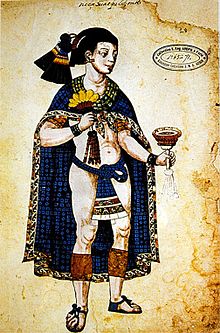- Nezahualpilli
-
Nezahualpilli Tlatoani of Texcoco 
A non-contemporary depiction of Nezahualpilli from the Codex Ixtlilxochitl.Reign 1473–1515 Born 1464 Died 1515 Predecessor Nezahualcoyotl Successor Cacama Offspring Cacama
Many other childrenFather Nezahualcoyotl Nezahualpilli (Nahuatl for "fasting prince"; 1464–1515) was ruler (tlatoani) of the Mesoamerican city-state of Texcoco, elected by the city's nobility after the death of his father, Nezahualcoyotl, in 1472.
Like his father, he was a poet, was considered a sage, and had the reputation of being a fair ruler. Only one of his poems survives: "Icuic Nezahualpilli yc tlamato huexotzinco" ("Song of Nezahualpilli during the war with Huexotzinco"). His court was a haven for astronomers, engineers, and soothsayers. During his reign, he abolished capital punishment for a number of crimes and struggled to keep the political independence of Texcoco during the increasing centralization of Aztec power in Tenochtitlán.
When he told Moctezuma II that the Texcocan wise men had foretold foreign dominion over the Valley of Mexico, the emperor challenged him to a ball game. Moctezuma considered the loss of the game a negative omen.[1]
He married a daughter of Ahuitzotl only to later have her executed. Her public improprieties and high social status qualified her for a punishment that would not have been applicable to someone of a lower status. He was said to have taken numerous consorts and fathered 144 children.
Nezahualpilli was succeeded by his son Cacama.
Notes
- ^ Fehrenbach (1973), p.103
References
- Fehrenbach, T.R. (1973). Fire and Blood: A History of Mexico. New York: Macmillan.
External links
 "Netzahualcoyotl". Appletons' Cyclopædia of American Biography. 1900.
"Netzahualcoyotl". Appletons' Cyclopædia of American Biography. 1900.
Preceded by
NezahualcoyotlTlatoque of Texcoco
1473–1515Succeeded by
CacamaCategories:- 1464 births
- 1515 deaths
- Tlatoque
- Texcoco
- Nahuatl-language poets
Wikimedia Foundation. 2010.
